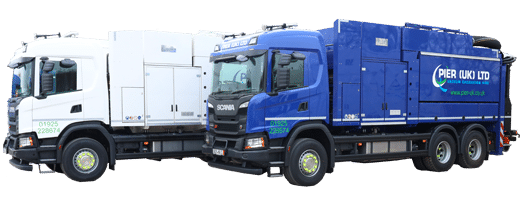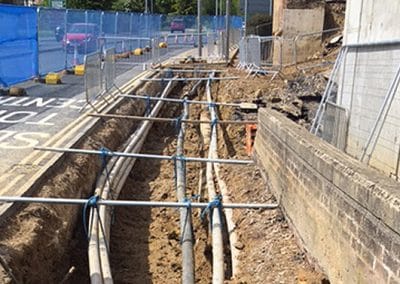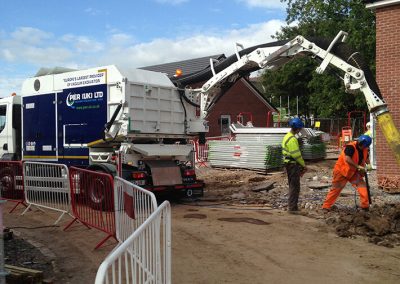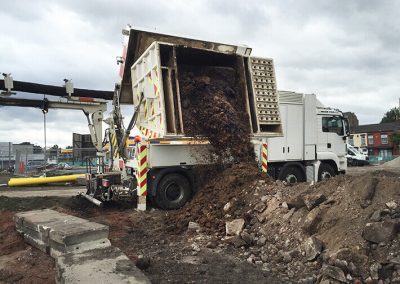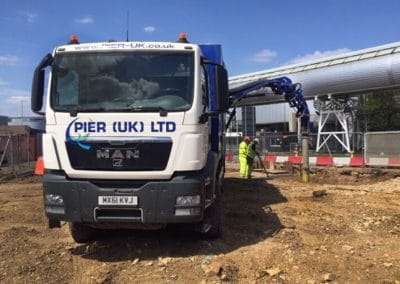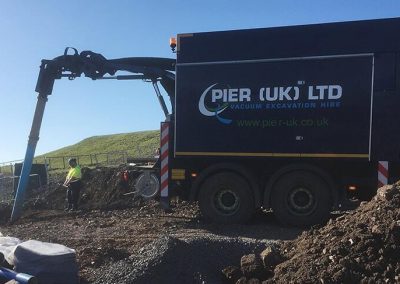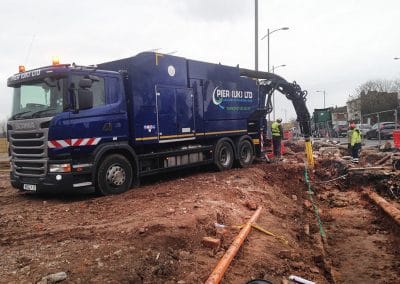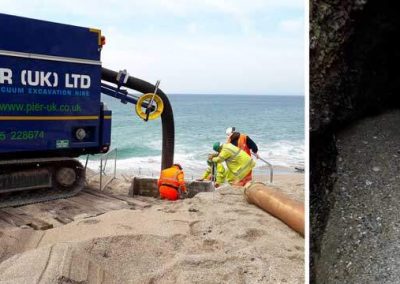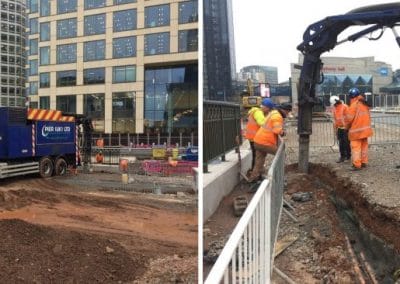Vacuum Excavation Lancaster
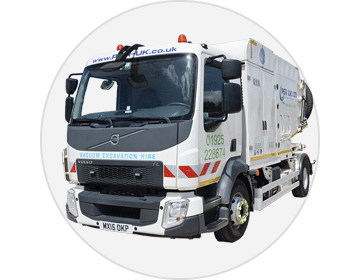 |
|
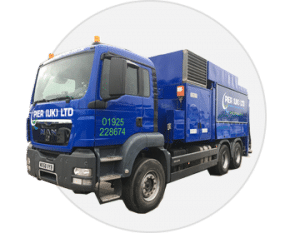 |
|
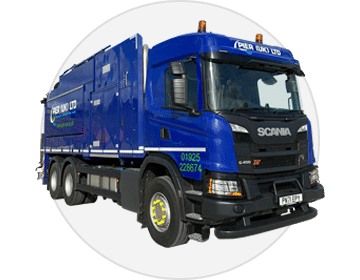 |
|
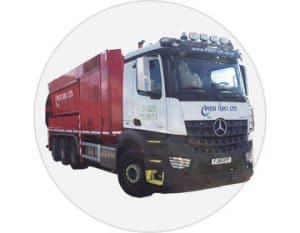 |
|
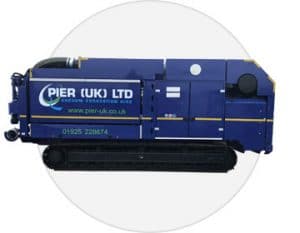 |
|
CITY SUCKER

| Weight (tonnes) | 16 |
| Width (m) | 2.3 |
| Length (m) | 6.3 |
| Height (m) | 3.2 |
| Air Compressor | 4.5m3/min, 8 bar |
| Capacity (m3) | 2 |
| Ideal For | Sites with limited or restricted access or in built-up areas |
DINO 4.5 TWIN FAN

| Weight (tonnes) | 26 |
| Width (m) | 2.5 |
| Length (m) | 9.7 |
| Height (m) | 3.8 |
| Air Compressor | 4.5m3/min, 8 bar |
| Capacity (m3) | 8 |
| Ideal For | For medium to larger scale jobs where more material needs to be removed |
DINO 8 TWIN FAN

| Weight (tonnes) | 26 |
| Width (m) | 2.5 |
| Length (m) | 9.7 |
| Height (m) | 3.8 |
| Air Compressor | 4.5m3/min, 8 bar |
| Capacity (m3) | 8 |
| Ideal For | For medium to larger scale jobs where more material needs to be removed |
RSP ESE 6

| Weight (tonnes) | 32 |
| Width (m) | 2.5 |
| Length (m) | 10.1 |
| Height (m) | 4.1 |
| Air Compressor | 4.5m3/min, 8 bar |
| Capacity (m3) | 12 |
| Ideal For | Large scale jobs. |
TRACKED VAC

| Weight (tonnes) | 20 |
| Width (m) | 2.55 |
| Length (m) | 7.7 |
| Height (m) | 3.2 |
| Air Compressor | 4.5m3/min, 8 bar |
| Capacity (m3) | 4.5 |
| Ideal For | Off-road sites where standard wheeled vehicles could not reach |
Vacuum excavation is a safe, environmentally friendly, efficient, and economical way to move earth on your site. It offers many benefits, such as a reduced risk of cable strikes and the ability to gently clear around tree roots without damaging them. These benefits make it easy to see why more and more people are turning to vacuum excavation as an alternative to traditional excavation methods. If you are planning a project in Lancaster or the surrounding area, see how vacuum excavation could help you.
About Us
PIER started life as a civil engineering company over twenty years ago. After first using vacuum excavation in 2009, we were so impressed with this method of excavation that we refocused our business to concentrate solely on providing vacuum excavation services to our clients. We have invested in our fleet of vacuum excavators to offer an excellent range of different-sized excavators suitable for different locations and scenarios. These include our City Sucker, the smallest vacuum excavator in our fleet and ideal for sites with little space and restricted access. Or, at the other end of the spectrum, our Tracked Vac is designed to access locations where wheeled vehicles cannot venture. We combine this with our professional and dedicated team of vacuum excavation specialists to provide our clients with a complete high-quality service nationwide.
Why Do You Need an Excavator?
If you need earth and debris clearing or moving on your site, you need a vacuum excavator. Vacuum excavation is safe and reduces the risk of cable strikes. Cable strikes can be dangerous, and even deadly, as well as causing massive problems to a project if they occur. Vacuum excavation reduces the risk substantially by clearing the earth using suction power. Not only is it safe, but it is also gentle. Vacuum excavation can carefully remove earth from around tree roots without damaging the tree. This can allow trees to be moved around on site and helps reduce the environmental impact of development work. Vacuum excavation is also powerful, which means it is an expeditious and effective way to clear large quantities of earth.
How Does Vacuum Excavation Work?
Vacuum excavation is a simple yet effective method. It uses the power of suction to draw the earth or other material through a long tube into the belly of the excavator. Once the belly is full, the excavator can move the earth to another location. The unique setup of a vacuum excavator combines the power to move vast quantities of earth quickly with the gentleness that allows this to be done without damaging delicate ecosystems, tree roots, or topsoil.
Download our brochures
Want to browse all we have to offer at a time that suits you? No problem! Simply download our brochure to find out more about our vacuum excavators.
How Can PIER (UK) Help You?
Here at PIER, we offer vacuum excavation services right across the country. We offer both self-drive and operated hire, so if you have a team member who is experienced using a vacuum excavator, you can make the most of this. We have an extensive fleet, which gives us the capacity to respond in an emergency and carry out lengthy projects. No matter the size or scale of your project, we are here to help. We have worked on national excavation projects, from beaches to canals, inner-city sites to airports, and canals to railway bridges. We pride ourselves on our work’s high standards and operating practices. We are accredited by many leading regulatory bodies, including Safe Contractor and CHAS, to name a few. This gives our clients peace of mind in the quality of the work that we carry out.
Looking for Vac Ex in Lancaster? Contact us – 24/7 Hire Available!
Look no further if you are looking for excavation services in and around Lancaster. The team at PIER are ready to help you with your next project, whether you are planning for some future development work or have a collapsed drain and need some urgent clearance. No matter the size or scale of your project, we are here to help. With our background in civil engineering, we understand the complexities and challenges of your project and will work with you and your site team to deliver on time and budget. Simply contact the team at PIER today on 01925 228 674
REVIEWS
FAQs
What is the daily productivity of a vacuum excavator?
This is all dependent on the ground conditions, but it is approximately 1.6m3 to 2.5m3 per hour.
Do you have different sized systems available?
Yes. With a hire fleet of over 50 vehicles, we have 16t, 26t and 32t wheeled systems, and a 21t tracked unit for those difficult to reach areas.
Is there an additional cost for the disposal of the excavated material?
Where does the unit discharge the excavated material?
A standard unit (26/32T) and our Tracked unit (21T) will tip to the side of the unit and the city sucker (16T) will tip to the rear.
How much material can a vacuum excavator hold?
Our larger vehicles have an 8m3 – 10m3 capacity, whereas the City Suckers has 2m3 capacity and our tracked vac has 4.5m3 capacity.
What areas do you cover?
We cover the whole of the UK.
What days and times are your vacuum excavators available to hire?
Our fleet of vacuum excavators are available for hire 24 hours a day, 7 days a week.
Do you only provide operated hire?
No. We also provide self-drive hire, with full training for your operatives.
Are your operatives trained and accredited?
All our operatives are CPCS trained and fully accredited.
How does the system deal with stubborn or compacted material?
All our systems are fitted with an air lance that our operators will use to displace and break-up material. The air lance is powered by the onboard compressor.
Do you supply extension pipework?
Yes, at an additional cost.
How old are your vacuum excavators?
More than 18 of our excavators are under four years old, which makes our fleet one of the most modern in Europe.
What is the total reach of the power arm?
Approximately 4.5 metres from the rear/nearside of the truck.
What is the diameter of the suction hose?
The suction hose has a 250mm (10”) diameter.
Can the diameter of the suction hose be reduced?
Yes. We can provide a suction nozzle adaptor to reduce to 150mm (6”) if required.
How much does it cost to hire a vacuum excavation truck?
We aim to keep our costs affordable and will quote each project on an independent basis, depending upon the type of excavator used and the size of the project.
Can vacuum excavation be used in both urban and rural environments?
We have excavators designed specifically for the urban environment, as well as tracked excavators that can be used in areas that are inaccessible with wheeled vehicles.
What are the limitations of vacuum excavation?
Powerful excavators can reach a depth of 60 feet, making their reach far greater than other excavation methods.
Are there any noise or vibration concerns with vacuum excavation?
Whilst vacuum excavators can be noisy, we constantly invest in our fleet to make sure we have the latest technology to reduce noise and vibrations. Our skilled operators will always work smoothly to ensure minimal disruptions.
Can vacuum excavation be used for landscaping projects?
Vacuum excavation is an ideal solution for landscaping projects, as it is an efficient and easy way to move large quantities of earth around your site.
What kind of documentation is required before and after a vacuum excavation project?
Our experienced project management team will work with you to ensure that you have all the relevant documentation for your excavation project.
Can vacuum excavation be used in areas with a high water table or wet soil conditions?
Vacuum excavation is often used in difficult conditions, such as working in high water table areas, the excavators can operate in a variety of complex ground conditions.

